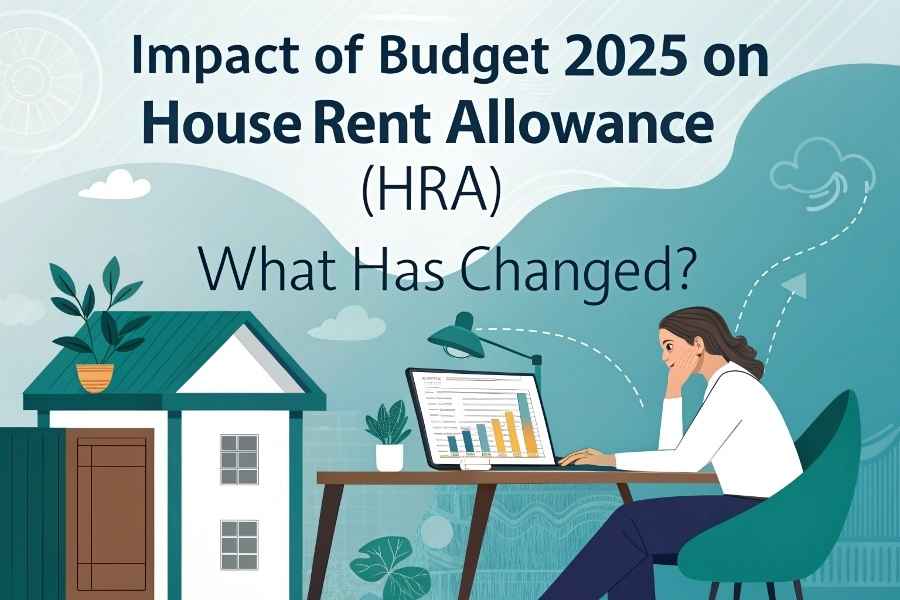Budget 2025 has introduced significant changes to the taxation system, including key reforms affecting House Rent Allowance (HRA). Previously, salaried individuals benefited from HRA exemptions under Section 10(13A) of the Income Tax Act. However, the latest budget proposes changes that could impact how employees claim HRA benefits.
In this article, we analyze what has changed in the taxation of HRA under Budget 2025, its implications for salaried individuals, and how taxpayers should plan their finances accordingly.
What is House Rent Allowance (HRA)?
HRA is a component of an employee’s salary, designed to help cover rental expenses. Under the old tax regime, HRA was exempt from taxation subject to certain conditions, including:
- The employee must be living in rented accommodation.
- The exemption amount was the least of the following:
- Actual HRA received from the employer.
- 50% of basic salary (for metro cities) or 40% (for non-metro cities).
- Rent paid minus 10% of basic salary.
However, the new budget brings major modifications to how HRA is treated in the tax system.
Key Changes to HRA in Budget 2025
1. HRA Included in the New Tax Regime
One of the most significant changes in Budget 2025 is the inclusion of HRA in the new tax regime. Previously, taxpayers opting for the new tax regime (introduced in Budget 2020) could not claim deductions under Section 10(13A). The government has now proposed integrating HRA into the new regime, allowing employees to benefit from rent-related deductions while opting for lower tax slabs.
2. HRA Tax Exemption May Be Removed
Under the existing tax structure, taxpayers under the old regime could claim HRA exemptions, reducing their taxable income. However, Budget 2025 proposes to tax HRA at source, making it fully taxable under the new regime. This move is aimed at streamlining tax benefits but may increase the tax burden for salaried employees who depend on HRA exemptions.
3. Stricter Compliance Measures for HRA Claims
Budget 2025 has introduced stricter documentation and compliance requirements for claiming HRA exemptions. Employees will need to provide:
- Valid rent agreements.
- Rent receipts with PAN details of the landlord (if rent exceeds ₹50,000 per year).
- Proof of rent payment, such as bank transfers or UPI transactions.
These changes aim to reduce tax evasion related to false rent claims, particularly in cases where individuals claim HRA benefits without actually paying rent.
4. Impact on Salaried Employees in Metro Cities
Employees in metro cities such as Mumbai, Delhi, Bengaluru, and Chennai may be affected the most. Previously, they could claim 50% of basic salary as an exemption under HRA. With the potential removal of HRA exemptions, their tax liability could increase significantly. For example:
- If an individual earns ₹12,00,000 annually and claims ₹3,00,000 as HRA exemption, they might now have to pay tax on the entire amount.
- This could lead to additional tax liability of ₹60,000–₹90,000, depending on their income tax slab.
5. Possible Introduction of Standard Deduction for Renters
To balance the removal of HRA exemptions, the government is considering a standard deduction for renters, allowing a fixed deduction for all salaried employees paying rent. However, the final details are yet to be announced.
Why Has the Government Made These Changes?
The government’s rationale behind these HRA reforms includes:
✅ Reducing Tax Evasion – Many individuals falsely claim HRA deductions despite living in self-owned properties or paying rent to relatives without genuine transactions.
✅ Simplifying the Tax Regime – By integrating HRA within the new tax regime, the government aims to make tax calculations easier and reduce dependency on complex exemptions.
✅ Widening the Tax Base – Making HRA taxable ensures a broader tax net and higher revenue generation for developmental projects.
Comparison of Old vs. New HRA Taxation Rules
| Aspect | Old Tax Regime (Before Budget 2025) | New Tax Regime (Post-Budget 2025) |
| HRA Exemption | Allowed under Section 10(13A) | Removed; HRA is fully taxable |
| Documentation | Basic rent receipts required | PAN of landlord + proof of rent payment |
| Tax Savings | Higher for those paying rent | Tax burden may increase |
| Standard Deduction | Not applicable | Possible introduction for all renters |
How Will This Affect Taxpayers?
For Salaried Individuals
- Those in the old tax regime will lose a significant tax deduction if HRA exemptions are removed.
- Those in the new tax regime may benefit if HRA is included with other deductions.
For Landlords and Real Estate Sector
- More transparency in rent transactions due to stricter documentation requirements.
- Potential increase in rental declarations, reducing under-the-table rental agreements.
For Employers
- Payroll structures may need adjustments to accommodate changes in HRA taxation.
- Employers might offer alternative salary components to compensate for lost HRA benefits.
Steps Taxpayers Can Take to Minimize Impact
1 ️ Evaluate Old vs. New Tax Regime – Compare tax liability under both regimes to decide the most beneficial option.
2 ️ Maintain Proper Documentation – Ensure all rent payments are made through official channels and collect rent receipts.
3️ Explore Other Tax-Saving Options – Use deductions under 80C, 80D, and 80E to offset the impact of HRA taxation.
4 Negotiate Salary Restructuring – Consider discussing alternative salary components like food coupons or LTA with your employer.
Conclusion
Budget 2025 has introduced a landmark change in HRA taxation, shifting towards greater transparency and compliance. While the move aims to streamline tax benefits and reduce evasion, it may increase the tax burden for salaried employees, particularly in high-rent urban areas.
To navigate these changes effectively, taxpayers should reassess their tax planning strategies, maintain proper documentation, and explore alternative deductions. As the government finalizes these proposals, further clarifications will determine the actual impact on different income groups.




